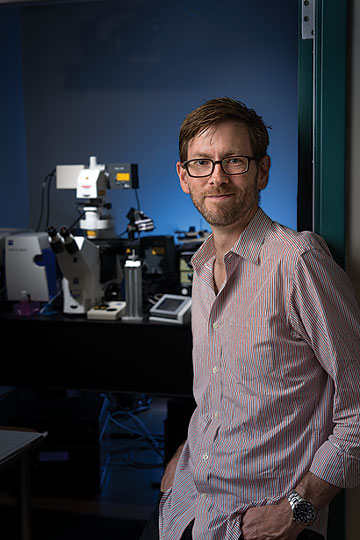
 Bright Ideas
Bright Ideas
Marcel Bruchez creates imaging tools to peer inside living cells
by Linda Schmitmeyer
When Marcel Bruchez talks about chemistry, his face alights with youthful enthusiasm. It doesn’t matter if he’s talking about the chemistry kit he received in third grade that helped him “blow things up” or his first American Chemical Society abstract. If he’s talking about chemistry, he’s excited.
“The great power of chemistry is that you’re not constrained by what is available,” says Bruchez, an associate professor of biological sciences and chemistry in the Mellon College of Science. “You can identify interesting biological problems and then design precisely the molecular details you need to interrogate, measure, and manipulate them.”
He’s been doing just that since his grad school days. As a Ph.D. student at the University of California, Berkeley, Bruchez modified nano-sized particles—called quantum dots—so they could be used to tag proteins and label cells, a technology that Science magazine named one of its Top Ten Scientific Innovations in 2003. Within months of that discovery, he co-founded Quantum Dot Corporation to market the new imaging tool to biologists and drug developers who sought a more detailed picture of molecular events.
“There is so much value to creating something that other people can use,” says Bruchez, who learned that lesson from his father, a furniture salesman who eventually started his own company. “My dad recognized an opportunity for lowcost ergonomic seating in manufacturing lines rather than just in offices. My parents saw an opportunity and built a company around it.”
That same entrepreneurial spirit burns bright within Bruchez.
Though Invitrogen purchased Quantum Dot Corporation a decade ago, Bruchez continues to solve biological problems with chemistry at his new company, Sharp Edge Labs, which he founded in 2011 with CMU professor and former Molecular Biosensor and Imaging Center (MBIC) director Alan Waggoner.
Named for the Pittsburgh beer emporium where the idea for the company was hatched, Sharp Edge Labs has developed a suite of imaging and detection tools that allow scientists to monitor the activities and locations of individual proteins found in living cells in real-time. Using these tools, Sharp Edge Labs can distinguish proteins less than 10 nanometers apart—a very sharp edge indeed.
“By carefully designing dyes and labeling protocols, we can quickly interrogate these properties in living cells,” says Bruchez. “This allows us to test biological processes very quickly, at a throughput required for drug discovery.”
Understanding these processes can directly impact our understanding of and treatment for disease, says Bruchez. To give just one example, MBIC researchers and their collaborators are using the tools to identify proteins inside cells that may control the function of drugs for cystic fibrosis, while at Sharp Edge, they are working to develop drugs that will make the disease more manageable.
Bruchez wears two hats as chief scientific officer at Sharp Edge and director of MBIC—a privilege he chalks up to the CMU culture.
“It’s a place that recognizes the value of entrepreneurial experience and offers people with that experience the opportunity to contribute to academia,” he says.
But he still thinks basic scientific research is a lot of fun. “I really like that gleam-in-the-eye, early-idea stage of ‘How am I going to change the world next?’ ”